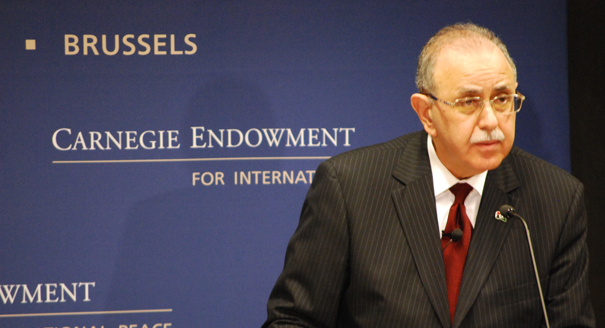Registration
Thank you!
You will receive an email confirming your registration.
Libyan Prime Minister Abdel-Rahim El Keib discussed Libya’s political transition and the future of the country at an event hosted by Carnegie. Carnegie’s Marwan Muasher moderated.
Libya’s Revolution
- Before Qaddafi’s Fall: Prior to the fall of the Qaddafi regime in Libya, freedom and dignity were distant dreams, El Keib asserted. He described how Qaddafi had used violence and oppression to dehumanize his people.
- Major Events: On February 17, 2011, the Libyan youth took to the streets. Despite Qaddafi’s promise that there would be “rivers of blood,” untrained men picked up weapons willingly and became committed to freeing their country, El Keib said. After thousands of deaths, the involvement of the international community, and a long-lasting struggle, Libya finally became free on October 23, 2011.
- Reconciliation: The government is committed to national reconciliation in the post-revolution era, asserted El Keib. He argued that no country can move forward without social peace, adding that the government is considering the formation of an Association for National Reconciliation to aid reconciliation efforts.
- Disarming the Brigades: There are many young men who fought hard throughout the Libyan revolution as members of local brigades. El Keib stated that the government has a plan to incorporate them in the Interior Ministry, the Defense Ministry, or to provide them with resources to pursue schooling or start businesses. These options would provide incentive for Libyan youth to disarm and continue with their everyday lives, El Keib added.
The Interim Government
- The Role of the Interim Government: While it is tempting for the Libyan interim government to seek a position of guardianship, their primary goal is to focus the energy of the Libyan people to realize and fulfill the aims of the revolution, El Keib said.
- The National Assembly: A National Assembly will be elected democratically to oversee the drafting of the constitution and to establish the legal rights of the Libyan people, El Keib added.
- Decentralization: The Qaddafi regime centralized government for the wrong reasons, El Keib argued. He stated that the interim government is committed to decentralization; for example, it has just finalized a law which divides Libya into governorates.
The Path Ahead
- What Libya Needs: El Keib stated that a strong civil society is important to guarantee transparency and accountability and to fight corruption. He added that the country needs a strong financial center in order to engage the international community as an effective and collaborative partner. While El Keib admitted that Libyan security is not yet absolute, he argued that no country ever has absolute security and contended that now is the time to invest in Libya.
- Optimism on Libya’s Future: Ultimately, El Keib expressed optimism about the future of Libya. He said that while there will certainly be challenges along the way, the Libyan people were able to overcome the brutal dictatorship of Qaddafi and will thus be able to succeed in this path to lasting change.
